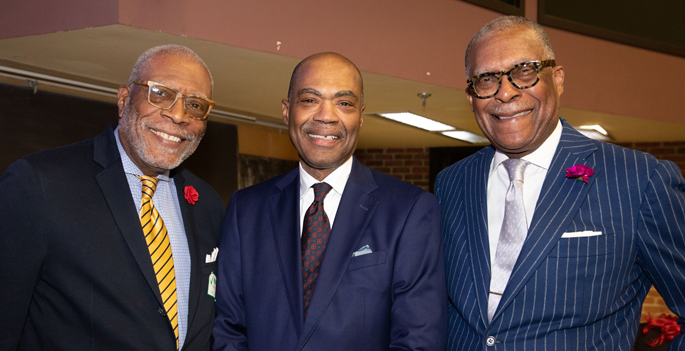
In May 2020, Kevin Churchwell, MD, then president and chief operating officer of Boston Children’s Hospital, helped launch a transformation of the 150-year-old hospital’s systems and structure.
Dealing with the worst worldwide pandemic in more than a century, Boston also had been shaken by the death on May 25 of George Floyd while being subdued by Minneapolis police. Protests were erupting all over the country.
Churchwell, a Nashville native and Vanderbilt University School of Medicine graduate who had served as CEO of Monroe Carell Jr. Children’s Hospital at Vanderbilt a decade earlier, considered these events as opportunities for change.
“We started hosting virtual town halls and fireside chats on racism and intolerance,” Churchwell said Monday during the John E. Chapman, MD, Lecture in Medical Education at Vanderbilt University Medical Center. “The question was, what were we going to do next?”
For Churchwell, who succeeded Sandra Fenwick as Boston Children’s CEO in 2021, the answer was to develop a comprehensive structure that heavily emphasized education.
The scope of the hospital’s Academy for Teaching and Educational Innovation and Scholarship was expanded to include programs in equity, diversity and inclusion.
Research grants, visiting professorships, symposia, fellowships — all were designed to support its commitment to becoming an inclusive learning environment.
To ensure continued commitment to these goals, in August 2020 Boston Children’s enunciated a six-point Declaration for Equity, Diversity and Inclusivity, which states that the hospital “does not tolerate any form of racism, discrimination or bias.”
The six-goal declaration expresses the hospital’s commitment to recruiting, developing and retaining a diverse workforce, eliminating structural racism from hospital policies, guidelines, and practices, and taking a leadership role in reducing child health disparities.
The hospital also provides comprehensive training on the impact of racism on child health and encourages “difficult” conversations that can enhance culturally effective pediatric health care delivery.
Racism isn’t going away. Those who work in the hospital will continue to be confronted by it. What is changing is the conversation, a commitment to verbally support one’s colleagues, rather than silently ignoring or accepting intolerance. The goal, Churchwell said, is to move from “bystander” to “upstander.”
“How do we make this experience the right experience,” he said, “not just for the trainees and the faculty, but also for the parents and the patients, so that the children get the care they should?”
In 2021, the hospital established the Sandra L. Fenwick Institute for Pediatric Health Equity and Inclusion to help reduce health inequities through research, further diversify the pediatric workforce and make an impact on public policy.
Something like a Marshall Plan, for example, is needed to address the national crisis in children’s mental health. “If we don’t do something,” Churchwell cautioned, “we’re going to lose an entire generation of children and, by definition, we’re going to lose the future of this country.
“Every child deserves the opportunity to have the best life possible,” he concluded. “My responsibility is to try to move away all the barriers.”
The Chapman Lecture is named for the late John E. Chapman, MD, who served as dean of VUSM for more than 25 years, and who made significant contributions at the national level to enhancing the quality of medical education.















